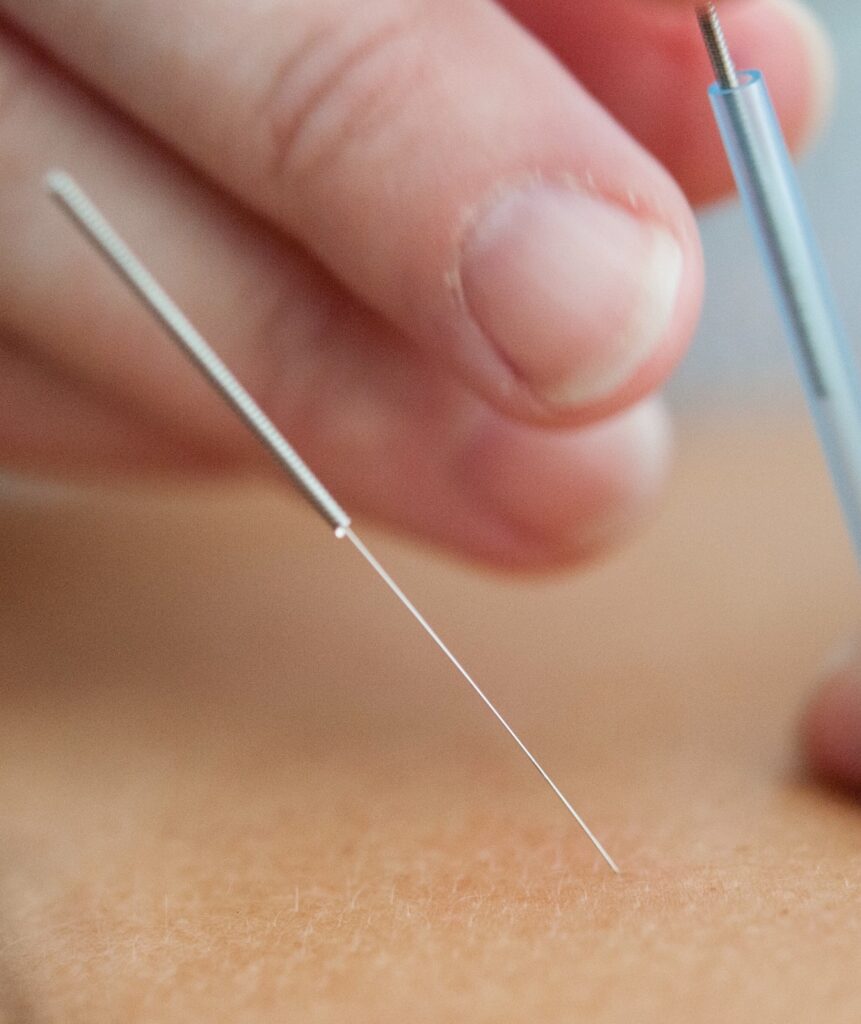Acupuncture

Acupuncture is a form of alternative medicine involving penetration of the skin with fine thin needles on specific points along the body’s channels or meridians based on a diagnostic and clinical reasoning. This stimulates areas of high electrical conductivity in nerves under the skin and, after several sessions, it causes the body to release certain hormones such as endorphins, reducing inflammatory makers and promoting healing from chronic pain and other conditions.
Acupuncture helps to treat:
- Neurological pain (Migraine, Tension headache)
- Chronic pain (Osteoarthritis, Fibromyalgia, Back pain, Neck pain, Postoperative pain)
- Gastrointestinal issues: IBS, SIBO etc.
- Gynaecological conditions: (Hot flashes, Infertility, PMS)
- Emotional disorders: (Stress, Anxiety, Depression)
- Allergies: (Asthma, Allergic rhinitis, Sinusitis)
How Acupuncture Supports and Heals Emotional and Mental Health: Evidence-Based Insights
Acupuncture, a key component of traditional Chinese medicine, has gained increasing attention in Western healthcare for its potential benefits in supporting and healing emotional and mental health. A growing body of scientific researchsubstantiates its effectiveness through various physiological and psychological mechanisms. Here’s an evidence-based exploration of how acupuncture contributes to emotional and mental well-being:
- Regulating Neurotransmitters and Hormones: Balancing chemicals like endorphins, serotonin, and cortisol to improve mood and reduce anxiety (Han & Snyder, 2006).
- Reducing Stress and Anxiety: Activating relaxation pathways and lowering stress hormones (Randolph, 2014).
- Improving Sleep Quality: Enhancing sleep patterns and alleviating insomnia (Penzel et al., 2018; Cho et al., 2017).
- Alleviating Depression Symptoms: Acting as an adjunctive therapy to conventional depression treatments (Zhang et al., 2014).
- Enhancing Cognitive Function and Emotional Stability: Boosting memory, attention, and emotional regulation (Walborn et al., 2013; Li & Wang, 2015).
- Activating the Mind-Body Connection: Promoting mindfulness and self-awareness for better mental health management (Brown et al., 2019).
- Brown, C., Liu, Y., & Smith, A. (2019). Enhancing the mind-body connection through acupuncture. Journal of Evidence-Based Integrative Medicine, 24, 2515690X19868169.
- Han, J., & Snyder, E. M. (2006). Acupuncture enhances levels of endogenous opioids and GABA in the spinal cord. Journal of Neuroscience Research, 84(12), 934–942.
- Li, H., & Wang, Y. (2015). The effect of acupuncture on emotional regulation and mood swings. Frontiers in Behavioral Neuroscience, 9, 155.
- Penzel, T., Schredl, M., Pinquart, M., & Storm, J. (2018). Acupuncture for insomnia: A systematic review and meta-analysis. Sleep Medicine Reviews, 40, 15–26.
- Randolph, M. (2014). Acupuncture for chronic low back pain. JAMA Internal Medicine, 174(10), 1654–1662.
- Walborn, S., Hodge, M., Simeon, D., van Heerden, J., Tai, R., Gerry, P., … & Morken, T. L. (2013). The efficacy of acupuncture for mild cognitive impairment: A randomized controlled trial. Journal of Alzheimer’s Disease, 35(2), 345–356.
- Zhang, Q., Yue, J., Lu, Y., & Sun, Z. (2014). Acupuncture for depression: A systematic review and meta-analysis. BMC Psychiatry, 14, 163.
